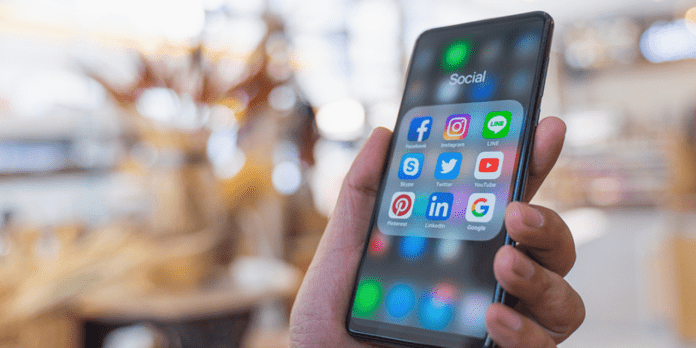As humans, we are innately hardwired to connect with other people. For hundreds of thousands of years, our method of human contact was primarily face-to-face interaction. With the advent of smartphones, computers, laptops, iPads, and other technologies, we have exponentially moved away from in-person communication into the digital world of social media. What is social media? How has it changed our dealings with others for better or worse?
Definition of Social Media
Social media is a host of websites and applications that allow their users to engage in the real-time sharing of interests, ideas, information, career opportunities, partnerships, and digital photos and videos. While there are numerous social media sites, the ones with the greatest popularity include Instagram, YouTube, Facebook, Twitter, TikTok, Pinterest, LinkedIn, and Snapchat with over two billion monthly users throughout the world.
The Advantages of Social Media

The attraction to social media is spurred by the following features that offer an alluring experience for its growing number of users.
(1) Free and Easy Access:
There is nothing tricky about signing up for a social media platform. A username, password, and email address will often suffice. For extra pizzazz, people set up their profiles with pictures and personal information that entice viewers to engage with them.
(2) Personal and Professional Connections:
Social media is much about connecting people to people. Elaborate search engines will allow individuals to find and link with family, friends, business acquaintances, and like-minded people who can be selected to join their digital community.
(3) Self-promotion:
Individuals and businesses alike can build their visibility on social media. All it takes is an investment of time and expertise to effectively manage a site. As a bonus, most platforms offer a feature that allows their users to advertise or promote individual posts for a designated fee based on time and audience reach. This has become a profitable enterprise for trendy sites like Facebook, Twitter, and LinkedIn.
(4) Information Galore:
Social media provides a venue for people to share expertise, offer opinions, and solicit advice on an endless array of topics. There is a never-ending stream of heartfelt, thought-provoking, mind jarring, and simply entertaining information on social media. To stimulate greater interaction, people can like, dislike, or add comments to others’ posts.
(5) Personalized Feeds:
Organizations like Facebook, Pinterest, and Twitter have designed sophisticated algorithms to control what specific users can see and do on their systems. Based upon a person’s profile, search history, and digital engagement, the user’s ability to view is streamlined to what the algorithm deems essential to him or her. This personalized approach increases the relevance and likelihood of engagement on the part of the user.
(6) Safety and Security:
As a rule, the popular social media sites allow users to block and report people or postings that make them feel uneasy. Additionally, these systems automatically filter out lewd and inappropriate material and have safeguards in place to prevent unwelcomed access to the user’s private information.
(7) Convenience:
Users can easily access social media sites from most digital devices via their Wi-Fi or internet service providers. Once the registration process is complete, logging into individual platforms is a breeze, especially if the username and password have been automatically saved.
The Drawbacks of Social Media
Despite the many pluses, there are some compelling reasons to be circumspect when using social media.
The major drawbacks for us as users include:
(1) Skewed Feeds:
Due to our individualized platform feeds, we are likely to receive biased postings that limit our perspective and narrow our chances of connecting with a diverse pool of people or resources.
(2) Faulty Information:
The material posted for us on social media may be tainted, untrue, or biased, leaving it up to us to interpret what is fact or fiction.
(3) Tarnished Character:
We can jeopardize our reputation by posting pictures and making comments via social media that may be used against us at a later date. Even something seemingly innocuous can cost us a job, destroy a relationship, or make us victims of cyberbullying.
(4) Security:
No matter how secure a social media platform is touted to be, there is always a risk of hackers getting into our individual accounts and using our personal data for nefarious purposes.
(5) Cyberthreats:
The more we divulge information about ourselves on social media, the greater our risk of falling prey to threats, intimidation, and malicious rumors that take us on a downward spiral.
(6) Unwarranted Advertising:
Social media giants generate billions of dollars in annual profits through selling advertising. They have it wired when it comes to using our profiles and online search habits to flood our feeds with customized advertising that lures us to buy.
(7) Fraud and Scams:
Social media is a magnet for scammers, especially when it comes to online dating sites. There are relatively few checks and balances when it comes to creating a profile on social media, so it is up to us to use caution when connecting with strangers.
(8) Addiction:
By nature of its design, we are seduced into using social media to fulfill all sorts of our wants and needs. The cravings we have to fill these voids can easily turn into a psychological addiction if left unchecked. Excessive use of social media can get in the way of our real-life connections and prove harmful to our emotional and physical well-being.
Smart Ways to Use Social Media

As an end user, exert a certain amount of caution when you are on social media platforms. Understand that all of them have their pros and cons, so it is up to you to manage your experience.
For a secure and fun way to use social media, our recommendations include the following…
(1) Monitor when and how much time you spend on social media.
(2) Pause before you post something that you might later regret.
(3) Minimize how much personal information you post on social media.
(4) Via the site itself, block or report anyone who is posing a threat or making you feel uncomfortable.
(5) Gauge the validity of any posting that seems too good to be true.




